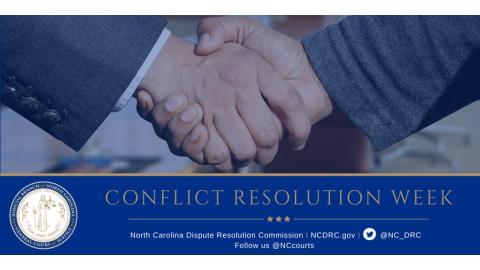Chief Justice Paul Newby Declares Third Week of October 2021 as Conflict Resolution Week
Article contents

Chief Justice Paul Newby has issued a judicial order declaring the third week of October (October 17-23) as Conflict Resolution Week for the Judicial Branch of the State of North Carolina. Conflict Resolution Week is intended to recognize the importance of dispute resolution to the Judicial Branch and to North Carolinians. Mediators address a wide variety of disputes, including misdemeanor criminal matters, child custody and visitation, equitable distribution, estates, guardianships, automobile accidents, business and contract matters and many others.
"Our state constitution guarantees the courts shall be open and justice is to be administered without favor, denial, or delay. Our alternative resolution groups allow us to make these constitutional promises a reality," Chief Justice Newby said. "North Carolina has demonstrated a strong commitment to developing programs which promote dispute resolution in our courts."
The North Carolina Dispute Resolution Commission (NCDRC) in partnership with the North Carolina Administrative Office of the Courts (NCAOC) Child Custody and Visitation Mediation Program and the Dispute Resolution Section of the North Carolina Bar Association (NCBA) will host a virtual event on October 21 to provide 3.5 hours of continuing legal education classes, including 2 hours of continuing mediation education, related to dispute resolution. Chief Justice Newby, North Carolina Administrative Office of the Courts Director Andrew T. Heath, and NCDRC Chair Judge Phyllis Gorham will appear via pre-recorded video. Those who wish to participate can email [email protected] to register.
ABOUT DISPUTE RESOLUTIONNorth Carolina has long had a strong commitment to programs that promote dispute resolution. The North Carolina General Assembly (NCGA) created mediation and arbitration programs that have successfully operated in North Carolina’s district and superior courts for more than 25 years.
In 1989, the NCGA passed legislation (NCGS § 50-13.1) to implement a statewide Child Custody and Visitation Mediation Program under the guidance of an Advisory Committee appointed by the director of the North Carolina Administrative Office of the Courts (NCAOC). Today, North Carolina is one of a few states in the country that has judicial districts that provide mandatory custody mediation for all 100 counties statewide.
Dispute Resolution Section of the NCBA was established in 1993 for the purpose of serving as a resource for developing and implementing Alternative Dispute Resolution (ADR) programs and techniques in the legal system and society at large.
The North Carolina Dispute Resolution Commission, established in October 1995, is charged with certifying and regulating private mediators who serve the courts in five mediation programs established by the NCGA. The Commission recommends policy, rules, and rule revisions relating to dispute resolution in North Carolina courts. The 18-member Commission includes members appointed by all three branches of government.
Thousands of disputes between individuals, family members, corporations, small businesses, governmental agencies, and others are brought before North Carolina civil and criminal courts each year. Mediation, arbitration, and other conflict resolution processes such as collaborative law, neutral evaluation, and restorative justice can help reduce the demands on the trial courts and improve efficiency. Many disputes are effectively addressed and resolved by the parties themselves with the help of a trained mediator or arbitrator, without the need to involve the police or the court system.
MORE INFORMATION
The NCDRC reports that of cases mediated in FY 2020-21, more than 57 percent of civil superior court cases and more than 68 percent of family financial cases were settled.
The court-ordered arbitration program reports on average a 21 percent appeals rate for arbitrated matters. The arbitration program also encourages early settlement of cases reflecting approximately 47 percent of cases noticed for arbitration are resolved prior to the arbitration hearing.
The Child Custody and Visitation Mediation Program reports approximately 19,000 people attended the group orientation sessions across the state each year. Additionally, almost 9,500 mediation sessions were held during the FY2020-21.
- Conflict Resolution Week 2021 Judicial Order
- Conflict Resolution Week Proclamation
- Community mediation centers certified by the NCDRC in North Carolina (by region)
- Podcast: Alternative Dispute Resolution is the Focus of Today's Episode of All Things Judicial